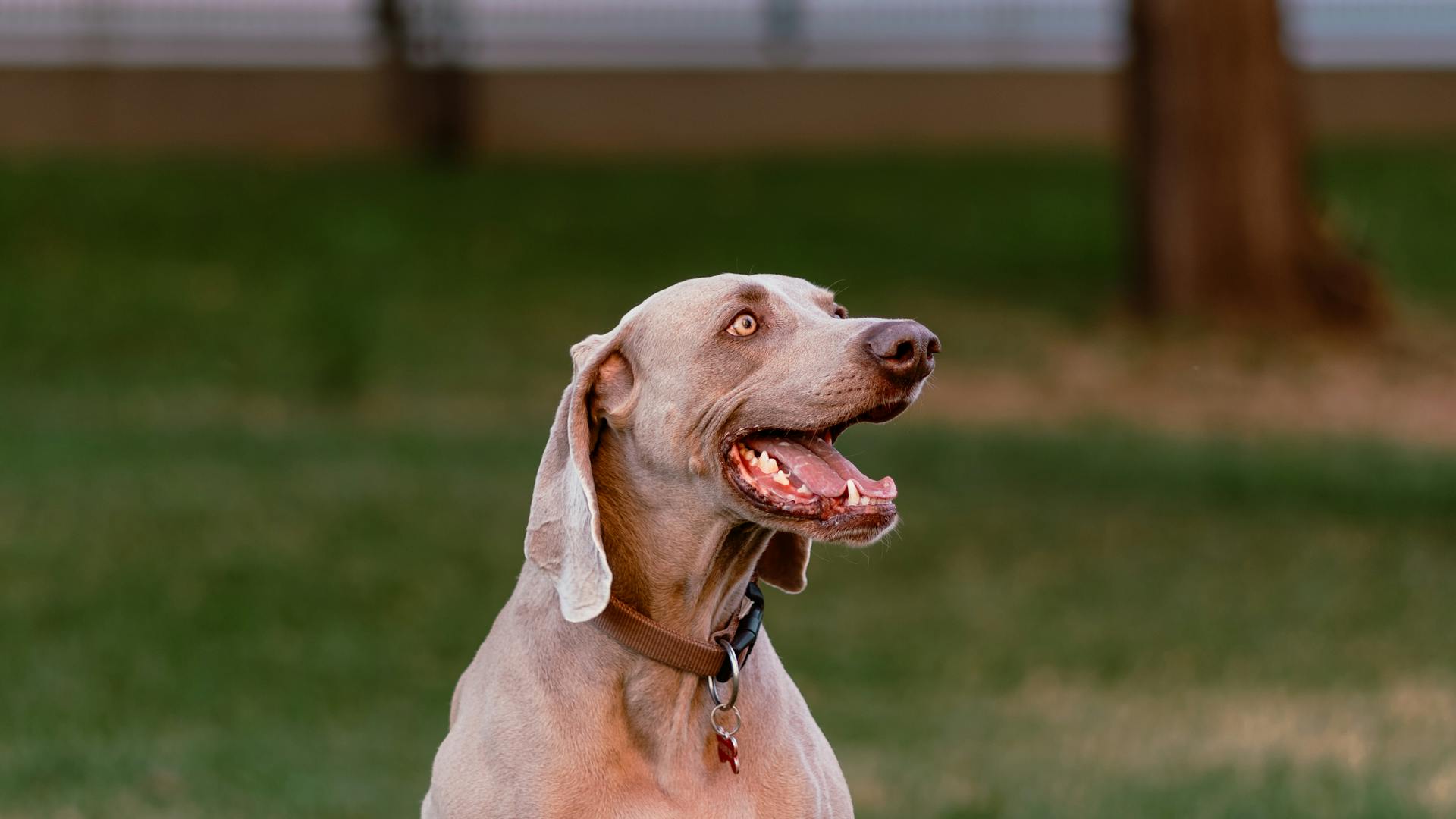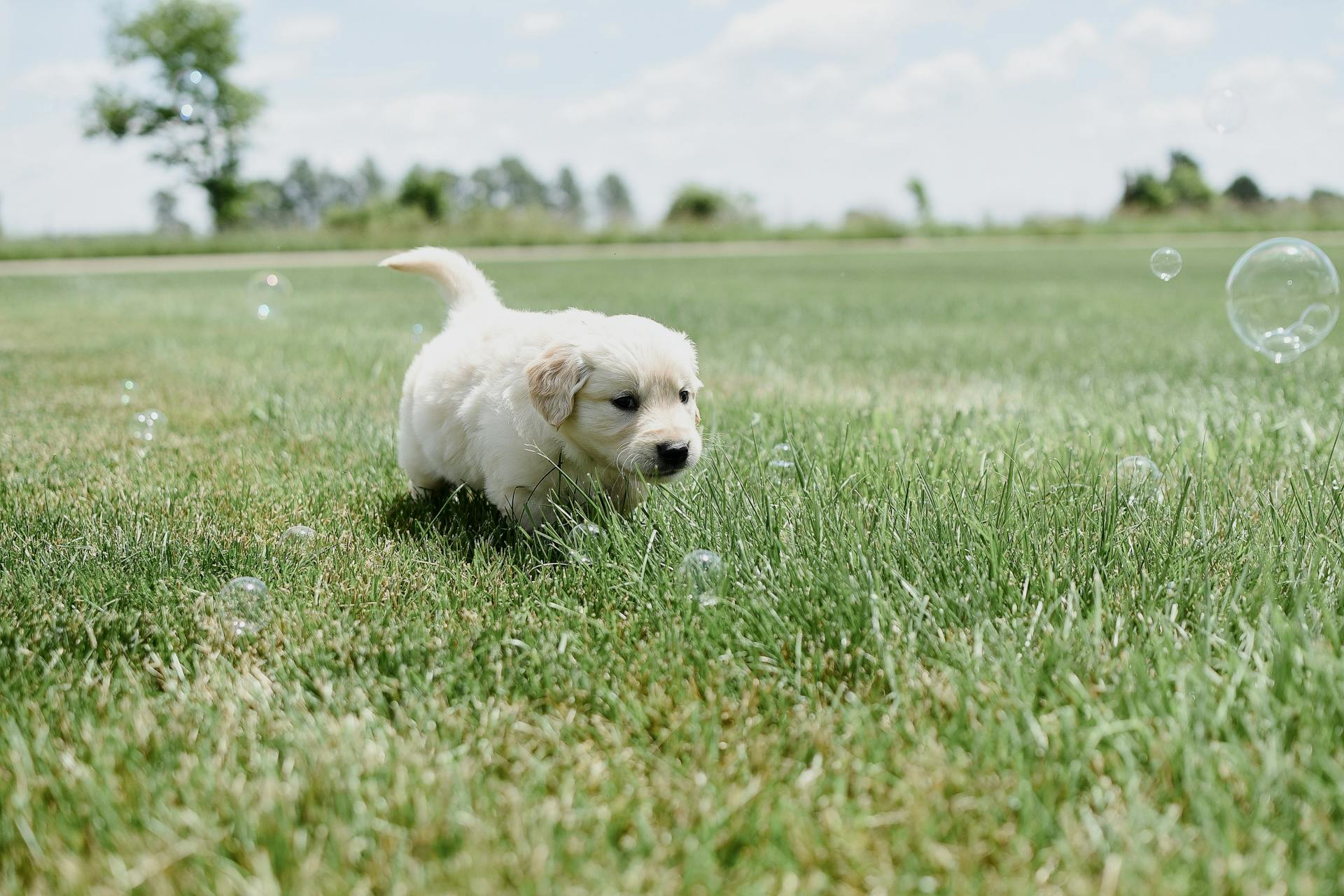
Weimaraners are a popular breed, but their suitability for families with kids is a common concern. They are often described as energetic and strong-willed, which can be a challenge for some families.
Weimaraners are naturally protective of their family, but this can sometimes manifest as wariness around strangers, including children. Socialization from an early age is crucial to help them feel more comfortable around kids.
Weimaraners are generally good with children, but it's essential to introduce them carefully and supervise interactions closely. If you're considering bringing a Weimaraner into your family, it's vital to assess your lifestyle and living situation to ensure it's suitable for both the dog and the kids.
Weimaraners require regular exercise and mental stimulation, which can be beneficial for kids who are old enough to participate in activities like dog walking and training.
Broaden your view: Rhodesian Ridgeback Good Family Dog
Are Weimaraners Good with Kids?
Weimaraners can make excellent family dogs if you're willing to commit to socializing and training them from a young age. This will give them the confidence to feel secure and happy in various situations.
Socialization is key, and it's essential to expose your Weimaraner to children, other people, and pets from a young age. This will help them become comfortable and confident around kids.
Even if your Weimaraner is an adult, it's not a lost cause. Discuss their history and personality with the rescue organization to see if they'd be a good fit for your family with children.
However, it's essential to consider the size of your Weimaraner, as they can accidentally cause injury to very small children by playing too hard.
If you have other animals at home, it's crucial to introduce a Weimaraner slowly to prevent any potential conflicts.
Additional reading: Weimaraner Dog Characteristics
Socialization
Socialization is key to helping your Weimaraner become a well-adjusted and friendly family member. Early socialization is especially important for Weimaraners to help them develop good manners and get along well with other animals and people.
Exposing your Weimaraner to different environments, situations, and people from a young age will help them become confident and well-adjusted adults. This can be as simple as taking them on walks around the neighborhood or to the park.
Worth a look: Weimaraner Black Rhodesian Ridgeback
To socialize your Weimaraner, start by exposing them to children in controlled environments, ensuring all interactions are closely supervised. Use positive reinforcement to encourage gentle and calm behavior around children.
Regular, positive experiences with children of various ages can help your Weimaraner become more comfortable and friendly around them. This can help build positive associations around spending time with children.
If your Weimaraner is nervous around children, ensure that they interact only from a distance at first, like from across the room with their harness on. Gradually build your dog's confidence by offering treats when the children are around and move closer to them bit by bit to prevent overwhelming the dog.
A well-socialized dog is more likely to be calm and safe around children, so socialization works best when you start young and do it in coordination with good training.
Safety Considerations
Interacting with Weimaraners requires supervision, especially around young children. Given their size and high energy, it's essential to ensure children know how to interact safely.
Teaching children to respect the Weimaraner's space is vital. This means not disturbing the dog while it's eating or sleeping.
Supervision during interactions is crucial to prevent accidental injuries. A safe and respectful environment is essential for the well-being of both the child and the dog.
Weimaraners should be well-trained and responsive to commands. This helps ensure the dog's behavior is predictable and safe around children.
Teaching children to interact gently with Weimaraners is also important. This includes avoiding rough play and understanding the importance of gentle interactions.
Real-Life Stories and Advice
Many families with Weimaraners report positive experiences, highlighting their playful nature and compatibility with active children. Weimaraners often enjoy being part of family activities.
Their playful nature is a great asset for families with kids, as it encourages them to be more active and engaged. They are natural companions.
Weimaraners are particularly affectionate and protective towards the children they are raised with. This makes them a great fit for families who want a loyal companion for their kids.
Their adaptability and energy level make them a great match for families with kids of all ages. They thrive in active households.
Explore further: Hot Dog Good Pizza Great Pizza
Addressing Concerns and Myths
Weimaraners are not typically aggressive by nature, but they can develop undesirable behaviors without proper training and socialization.
Their calm demeanor makes them a great match for families with kids, but it's essential to remember that any signs of aggression are typically due to a lack of training, socialization, or mistreatment.
Their friendly nature means they're often eager to please, which makes training a breeze if done correctly.
With patience and consistency, you can help your Weimaraner become a well-behaved and loving companion for your kids.
Ensuring Child Safety
Supervising interactions between your child and Weimaraner is essential to prevent accidental injuries.
Given their size and high energy, Weimaraners should be supervised when interacting with young children.
Teaching children how to interact safely with large dogs is vital for preventing injuries.
Teach your children to respect the Weimaraner's space and interact gently.
Always supervise interactions between your child and the Weimaraner, and ensure the Weimaraner is well-trained and responsive to commands.
A safe and respectful environment is crucial for the well-being of both the child and the dog.
Regular veterinary care, a balanced diet, and plenty of exercise and mental stimulation are necessary to ensure the Weimaraner's health and happy temperament, which in turn ensures a safe interaction with children.
Weimaraner Temperament and Behavior
Weimaraners are known for being very friendly, loyal, energetic, intelligent, and loving toward family members, but every dog's personality is different and can be shaped by socialization, environment, and background.
They typically need up to 2 hours of exercise per day due to their high energy levels, but many aren't too proud to hop up on the couch for a big cuddle when you get home.
Weimaraners can be good with children, especially if they are raised with them from a young age, and are known for being affectionate, loyal, and often protective of their family members.
However, their high energy levels and size mean that interactions with very young children should be supervised, and training should focus on teaching them appropriate behavior around children.
Weimaraners respond well to positive reinforcement training methods and can be trained to be gentle around kids, but they do need regular exercise to burn off energy and prevent over-exuberance.
Expand your knowledge: Is German Shorthaired Pointer a Good Family Dog
Signs that a Weimaraner is comfortable around a child include relaxed body language, willingness to engage in gentle play, and a calm demeanor around them.
If your Weimaraner shows signs of discomfort or aggression towards children, it's essential to address this behavior immediately and provide the dog with a safe space.
Exposing your Weimaraner to children in controlled environments and using positive reinforcement can help them become more comfortable and friendly around kids, and socialization should start as soon as possible, even from the moment you bring them home.
Exercise and Play
Weimaraners are high-energy dogs that need plenty of exercise to stay happy and healthy. This means daily walks, runs, or play sessions are a must. They thrive on regular physical activity and enjoy participating in dog sports like agility, obedience, or tracking.
To prevent boredom, Weimaraners also need mental stimulation. This can be achieved through puzzle toys, interactive games, and training sessions that challenge their intelligence and problem-solving skills.
Supervising playtime with kids is essential, especially with younger children, to ensure it remains safe. Weimaraners may sometimes play too energetically, so it's crucial to teach them gentle play habits.
If your Weimaraner shows signs of discomfort or aggression towards children, address this behavior immediately by providing a safe space and considering consulting a professional dog trainer or behaviorist.
Final Thoughts
If a Weimaraner has positive experiences with children, they can be great with kids.
Proper training and socialization are essential to ensure a harmonious relationship between the Weimaraner and the children.
Building a relationship based on mutual respect is key to a successful family dynamic.
Weimaraners are best suited for families who lead an active lifestyle and can provide the mental and physical stimulation they need to thrive.
With their loyal and affectionate nature, Weimaraners can form strong bonds with their human family members.
Responsible ownership and proper training are crucial to ensuring a happy and harmonious relationship with your Weimaraner.
If you're willing to commit to providing the necessary care and attention, a Weimaraner can become a loyal and loving member of your family.
Expand your knowledge: Are Boxer Dogs Good Family Dogs
Featured Images: pexels.com


